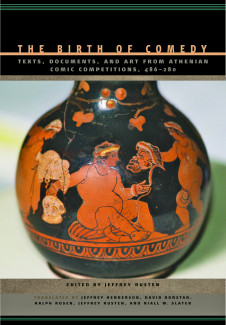
Johns Hopkins UniversityEst. 1876
America’s First Research University
Before TV, “Comedy Central” was classical Athens

Komoidia (“party song”) was a type of play invented to mimic tragedy at the festival of the God Dionysus in 486 BC, and by mid-century it was as popular as its dignified

ancestor. You may have heard of Aristophanes, but he was only one of many creators of these no-holds-barred plays full of raunchy dialogue and situations, outrageous parody, and savage political satire: Cratinus mocked Pericles as an absurd Zeus wannabe (and exploited his own reputation as a drunk by turning his failed rehab attempt into a comedy), Eupolis staged a resurrection of dead politicians to sort out the corrupt government of his own day, the (all male) actors wore fat suits with phalluses and grotesque masks, or portrayed empowered women and talking animals ready to overthrow Athenian men.
Within decades this transgressive form (“Old Comedy”) was swept away by a more modern (raunch-free and non-political) second generation of New Comedy, where families of middle-class fathers, sons, wives, and daughters bicker and scheme and cause chaos with a guaranteed happy ending the ancestor of today’s sitcom (although slaves, prostitutes and pimps also make their appearances from the Athenian street).
These plays are sometimes thought to be lost, but there survive numerous excerpts, plot-summaries, even illustrations that have been collected and studied by specialists. Here for the first time a team of five scholar-translators makes the best of these texts and illustrations accessible to modern readers, with brief notes and an introduction using the material to tell the story of this first golden age of comedy, a medium that has been going strong ever since.
Jeffrey Rusten is a professor of classics at Cornell University. His book, The Birth of Comedy: Texts, Documents, and Art from Athenian Comic Competitions, 486–280, is now available in paperback.


